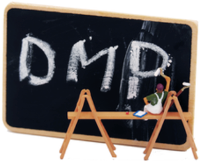Vaidas Morkevičius, PhD, from the Lithuanian Data Archive for Humanities and Social Sciences (LiDA) visited the Slovenian Social Science Data Archives (ADP) between 15 and 16 April 2019. A two-day visit was full of interesting discussions and useful two-way information sharing.
The visit was part of the mentorship programme of the CESSDA Widening Activities 2019 project, aimed at assisting aspiring non-member CESSDA service providers in getting support in services, tools, and knowledge, finding out about emerging national data archiving activities, and increasing CESSDA’s visibility in non-member countries.
The main purpose of Morkevičius’s visit of ADP was receiving guidance on the Core Trustworthy Data Repositories Requirements (CoreTrustSeal) by getting a glimpse into the experience of the ADP with its certification process and receiving support in developing a digital preservation policy that would determine the rules, responsibilities, roles and a system of monitoring data management in LiDA.

DAY 1:
INTRODUCTION INTO THE CORETRUSTSEAL APPLICATION
Morkevičius and our Head of Digital Preservation, Maja Dolinar, discussed in detail the process of applying for a CoreTrustSeal certification. This included a quick overview of the 16 CoreTrustSeal requirements and consideration of how they apply to CESSDA members.
It was clear from the start that LiDA currently has varying levels of progress concerning individual requirements towards certification since their organisational infrastructure and sustainability challenges are either not well developed yet or at the moment impossible to fully determine. A first step towards preparing a CoreTrustSeal certification application ought to be a preparation of a digital preservation policy, where LiDA would define its mission, rules, responsibilities, roles, and functioning, specifically focusing on establishing appropriate pieces of evidence that would support the responses to individual requirements. The policy should focus on defining areas where improvements are necessary in order to ensure larger transparency and fulfillment of the core mission of the organization. Morkevičius got an overview of the experience of the ADP in preparing its Digital Preservation Policy and creating the necessary pieces of evidence to support the statements being made in the policy document.
A GLIMPSE INTO THE DATAVERSE SOFTWARE
One of the identified additional services, needed by the ADP is to offer a self-archiving tool for researchers and doctoral students to deposit smaller studies and studies of lesser scientific and methodological quality in order to assure their long-term preservation and access for reuse. For this reason, we started examining tools that would enable such functionality already in 2016 with the help of our international partners during the CESSDA SaW project.
Since the ADP is currently in the process of adapting its local installation and aims to offer it to the users as a self-archiving tool Dataverse, we were happy to share all of the experiences in the installation and adaptation process with Morkevičius.
INSIGHT INTO THE WORK AT THE ADP
The day continued with discussing the process of data archiving within the ADP. Brigita Bočkaj, the Head of Access and Use and a Digital Archivist at the ADP, walked Morkevičius through the process of archiving, which included an introduction to the policy of archiving, insight into the legal documents and templates and discussion of the needs of LiDA regarding data archiving workflows and procedures in the future.
DISCUSSING FUTURE PLANS
The first day ended with a casual meeting of our guest with the Head of ADP, Janez Štebe. The meeting focused on reporting about the CESSDA ongoing meetings and projects. The needs of the less mature data services were discussed, as was the importance of using internationally accepted metadata standards (such as the Data Documentation Initiative (DDI)) and metadata harvesting protocols, such as the OAI-PMH (important for sharing catalogues on the European level in the CESSDA Data Catalogue).
DAY 2:
Morkevičius continued the discussion with our Head of Digital Preservation, Maja Dolinar, about the individual CoreTrustSeal requirements. Each of the individual requirements was explained in detail, sharing experiences of the ADP on how to prepare the response and additional supporting documentation. Since our Head of Digital Preservation is a member of the CESSDA Trust Working Group and a member of the Assembly of Reviewers of the CoreTrustSeal, additional tips and tricks were shared on how to prepare a successful application and appropriate supporting documentation.
THE IMPORTANCE OF NATIONAL SUPPORT
The second day continued with Morkevičius discussing with the Head of ADP, Janez Štebe, and the Director of Administration, Irena Vipavc Brvar, the critical points of the CoreTrustSeal requirements. In particular, requirements connected with sustainability, which need a guarantee by third parties, were exposed as the most challenging by our guest. Examples referred to establishing institutional, funder and peer national or international organisational agreements.
MEETING AT THE PUBLIC OPINION AND MASS COMMUNICATION RESEARCH CENTRE (CJMMK) AND WITH SIMONA KUSTEC
Later that afternoon, dr. Morkevičius visited the Public opinion and mass communication research centre (CJMMK) that is the service provider for European Social Survey (ESS), where he discussed together with Mitja Hafner Fink, Slavko Kurdija and Janez Štebe the forms of cooperation established between the two infrastructure units, that is CESSDA and the ESS. Information was exchanged about the Cronos panel and the SERISS project results.
The visit ended with our guest metting Simona Kustec, Chair of Policy Analysis and Public Administration, who was introduced by Janez Štebe. The discussion went around the planned national projects, that are of common interest from both a research and data service perspective in Slovenia and Lithuania.


